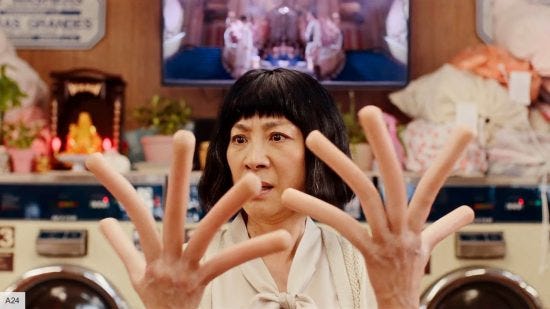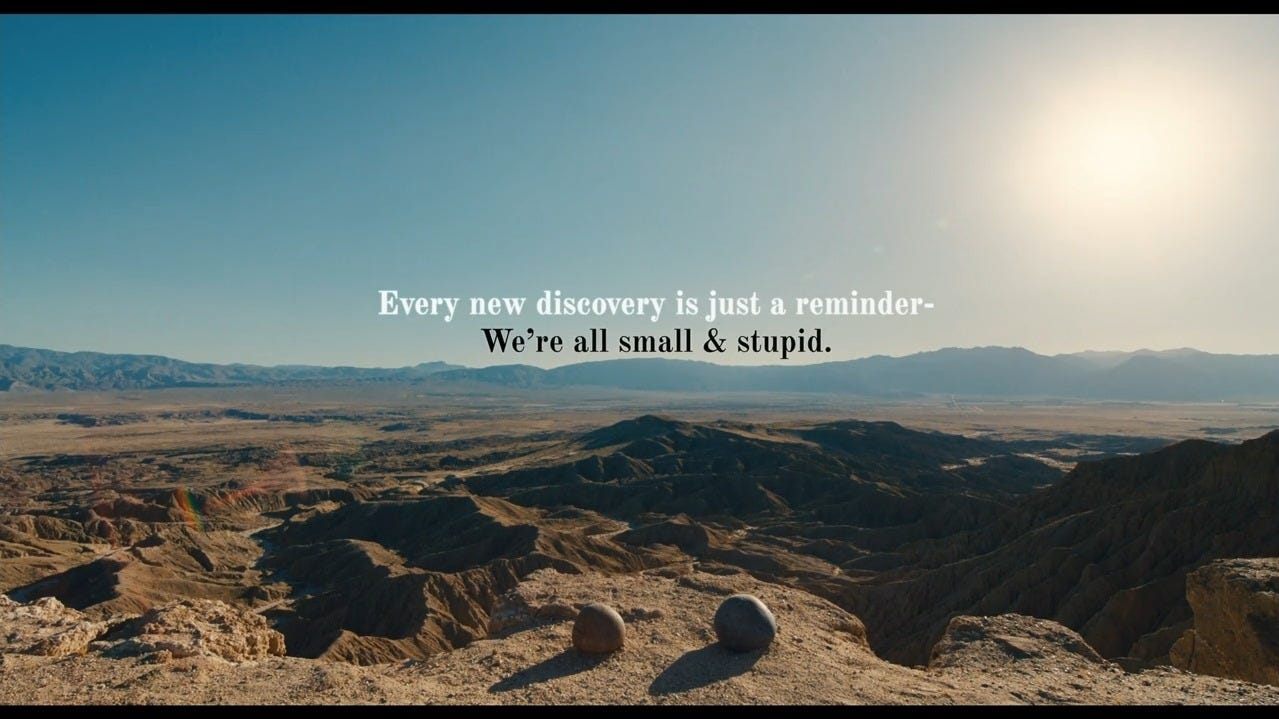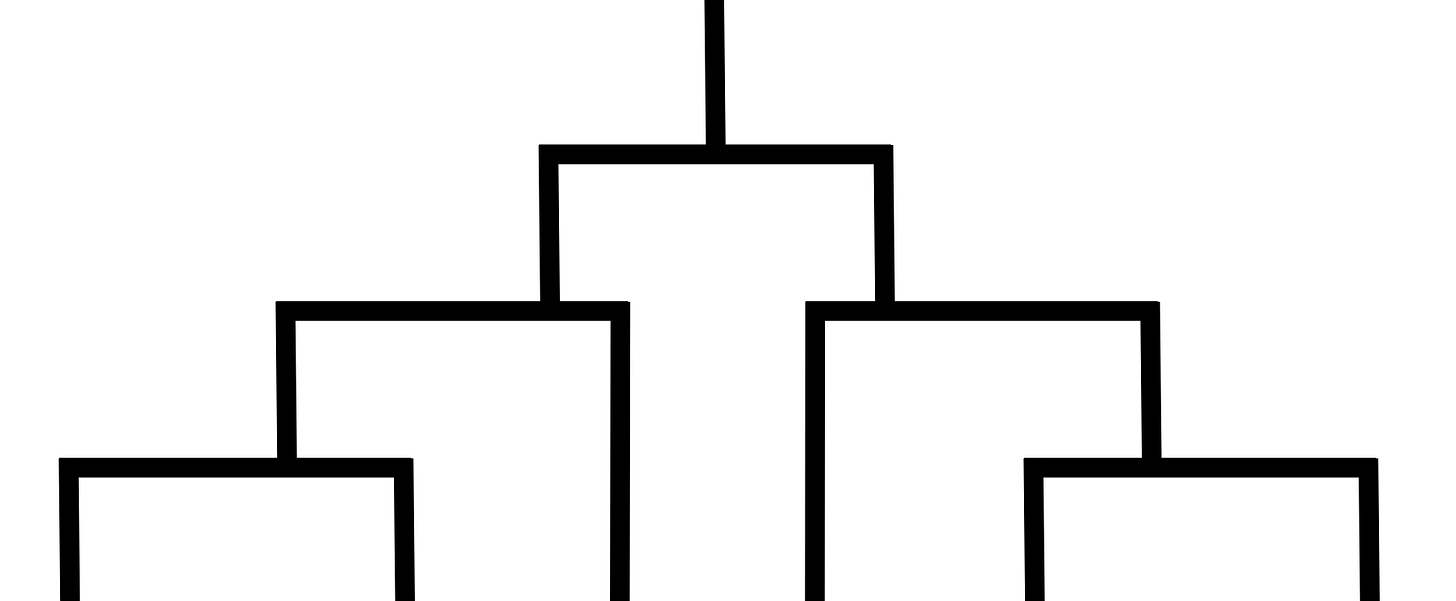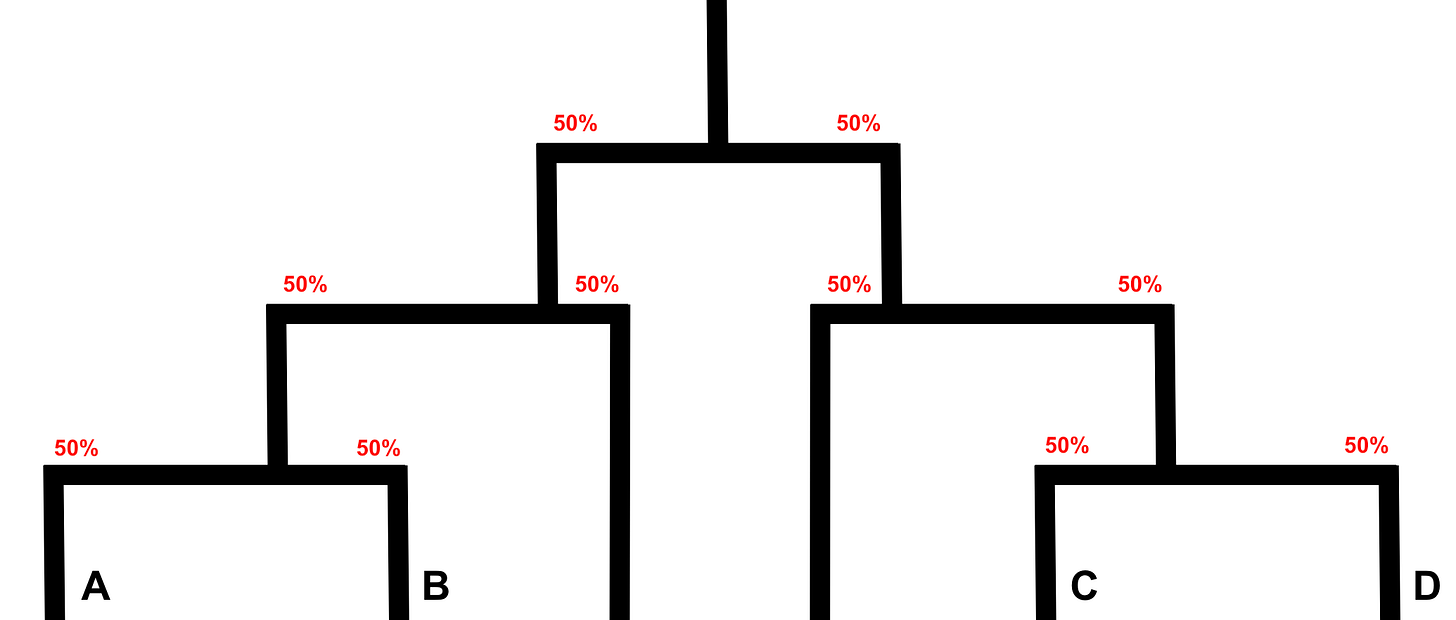What happens when you go against the entropy of the universe?
the art of meaning making

I recently rewatched one of my favorite movies of all time—Everything Everywhere All at Once, and while it’s no secret that many of us have felt this movie deep within our soul, it has also been the source the most absurd sequences in modern day cinema. From a man chewing gum off the bottom of the table, another man landing straight down a butt plug shaped trophy only to have it—well, you know, this movie is no stranger to making you question—”what in the actual f*ck did I watch just now????”
These acts aren’t just meant to shock you, though. These seemingly pointless acts are paradoxically the most intentional, for it is an action deliberately chosen to trigger one consequence: travel to a different universe. Called verse jumping—it works when someone commits a statistically impossible action in their current universe. When someone commits such an action, like chewing gum off the table, the universe reacts by creating a breach, which allows them to “jump” to another universe. There, they are encountered with themselves in different life choice scenarios—they have a different quality of life, different skills, and more.
But within all this absurd imagery from flying raccoons to Michelle Yeoh turning into a rock with googly eyes to Stephanie Hsu beating a man with a dildo that magically appears in her hand, I couldn’t help but think about how real this movie is at its core. In a sense, to will yourself into a new reality is to do the absurd. Like how Ke Huy Quan induces paper cuts between all five of his fingers, or how Michelle Yeoh screams “I love you” to a very angry Jamie Lee Curtis charging at her with the intent to kill, the reality around us cannot shift without genuine, improbable effort. To verse jump is to do the very thing you believe you can’t, even as every piece of matter in your body screams against it. You stand against that impossible force and dive against resistance.
Verse jumping feels akin to the metaphor of dreaming. Because dreaming, and the effort you embark on in order to realize it, comes at the cost of doing something so out of the ordinary to what is usual to you. In the modern age, a dream is more of an intrusive thought at minimum, or a source of inspiration at most, until you are faced with a seeming reality that makes you give up until you dream all over again. Daring is not even a choice. A journey towards a dream is something so grand and all consuming that people spend their whole lives choosing to stay in their lane. You close up this path, for fear of failure, fear of effort, or something else entirely. And to pursue that dream is to find that statistically improbable path, over and over and over again. The effort seems daunting. What if you don’t make it? Or even worse, what if you end up worse off than you would’ve been if not for this journey? This is not only an uphill battle, but a lonely search in a sea of infinite.
However, contrary to my belief in free will is my belief in fate. To be more specific, I don’t believe in fate from a philosophical standpoint, but rather—a spiritual one. While I don’t think we are powerless in our choices, I do think we all carry cosmic baggage, baggage that makes it probable for us to act one way, but almost impossible to act another. I like to think of this cosmic baggage, whether that is our upbringing, our trauma, or our personalities, as the universe’s way of preserving its entropy. I believe that none of us are above the universe, and none of us are an exception to the laws of physics. When you try, the amygdala signals the release of a carefully brewed concoction of intricate atomical patterns, designed to keep us on the path of least resistance. In this sense we are no different from matter, for we are literally built to obey the rules of instinct, an instinct that is the universe itself. We are no bigger than anyone, or anything, around us. As Michelle Yeoh and Stephanie Hsu says, “Every new discovery is just a reminder…we’re all small and stupid.”
I want to guide you through this idea from a more scientific approach. To explain, I will show you a graph and point out some logical observations.
As you can see, this graph is arguably one of the most accurate and mathematical depictions of life. If we are the product of our choices, then the fact that this graph diverges only means that each point is a choice and that choice leads us to a different reality. For example, in one reality, I throw a ball at a tree and a branch fell. In another one, I hold onto the ball at the very last second. The branch did not fall. I like to think of these as two completely different universes—one branch is on the ground, the other is still intact. After all, it is impossible for these two events to unfold for us in the same timeline, for the same matter—the branch—cannot occupy two different spaces at the exact same time. That is a violation of the laws of physics.
Two things currently hold true about this graph. You will always be at some point on this graph, and you will always be moving down this graph. With this, you can make the observation that at every point in the graph, you are able to map out the exact path that has led you to this point in the graph, because that is something that has already happened. But is it true the other way? Can we determine where we will end up given our current position on the graph?
Yes—we can, but we need more information.
Let me show the same graph, this time with percentages.
If we are given the probability of going down each path as seen above, we can make some mathematical observations of where we end up. If we were to have a 50% chance to make each choice at any given intersection, then points A, B, C, D each have a 12.5% chance of being the final destination, while the unmarked paths each have a 25% chance.
Now, we are finally able to make some observations about our position in the future, but it isn’t completely deterministic. This still does not validate my belief in fate, and even undermines it. But with this graph, we are faced with another truth. Now imagine instead that we only have 100% paths. At each point, you are going to choose 1 path over the other for 100% of the time. Then that is fate, because now you are able to determine your exact point in the future given your present point. Aha!
While this is only possible in a vacuum, since no one makes 100% choices 100% of the time, I think this reveals the simple truth that wanting does not come without trying. We are often allergic to effort, because of the looming fear—fear of choosing wrong, fear of judgement, and fear of resistance. But we cannot expect the laws of physics to break in on itself. If you want to be a writer but you never write, then you are not going to be a writer for 100% of the time. If you want to be an influencer but you never post a single thing on any social media platform, then that will never happen. If you were to tell me that you want to be a software engineer and also tell me that you are never going to write a single piece of code, then I can quite literally see in the future that you will never be a software engineer, given that the information that I have is the truth. In that sense, following entropy leads us to a self-fulfilling prophecy—or “fate.”
We all fear. In 2025, it’s hard not to be wrapped up in your head about the what ifs when you are faced with the option for another choice. What if it doesn’t work out? What if people hate me? What if you fail and it not only hurts that you’ve failed, but now you’re embarrassed by all the pitiful faces around you? Every day when we are faced with the absurd—the choice to slice paper between your fingers or chew gum off the bottom of the table, entropy seems to scream at you—no. Don’t do that. To be human is to fear the universe. To fear means you are just like everyone and everything around you—a piece of matter on a floating rock—floating around a plasmic rock—floating around the universe. To be matter only means to obey the laws of entropy.
While there is comfort in this thought, we can’t help but think there is something more. Minds can’t help but hope. While the universe may take trillions of years before it perfectly aligns a 1000 piece puzzle, we sometimes have the patience to sit there, fitting every single piece one by one, knowing that there is something that culminates in the end. To follow our minds is a refusal to drift along the path of least resistance. To follow hope is to reject the current universe, and go against entropy itself.
So why not hope? To hope is to make meaning, for in our pursuit of meaning making lies our quiet resilience to the truth: we are all just entropy. We are all just floating pieces of dust on a cosmic rock. But nihilism flips in on itself in the hands of the mind. If nothing matters, we are free to choose what matters for us—everything matters. So go for your dream. Believe in a higher power. Love your children. Assign depth to poetry. No matter what, never let go of your ability to make meaning of it all.
I’ve recently thought a lot about the very human nature of exercising our free will and wanting something because I’ve been thinking about whether I am living my life the way I want to be living. While nothing stops me from going down the path of least resistance, I can’t help but hope. Hope that there is something more out there for me. But I’ve spent so much of my life stuck in fear, because of this belief that I shouldn’t even dare to achieve what I think is impossible. In the next part of this story I want to share with you a more personal reason why I came to write this. But the next part is not a finished story, but an ongoing journey that I hope to take you all on in the future to come!
Thanks for reading! Please subscribe and share if this resonates with you!





